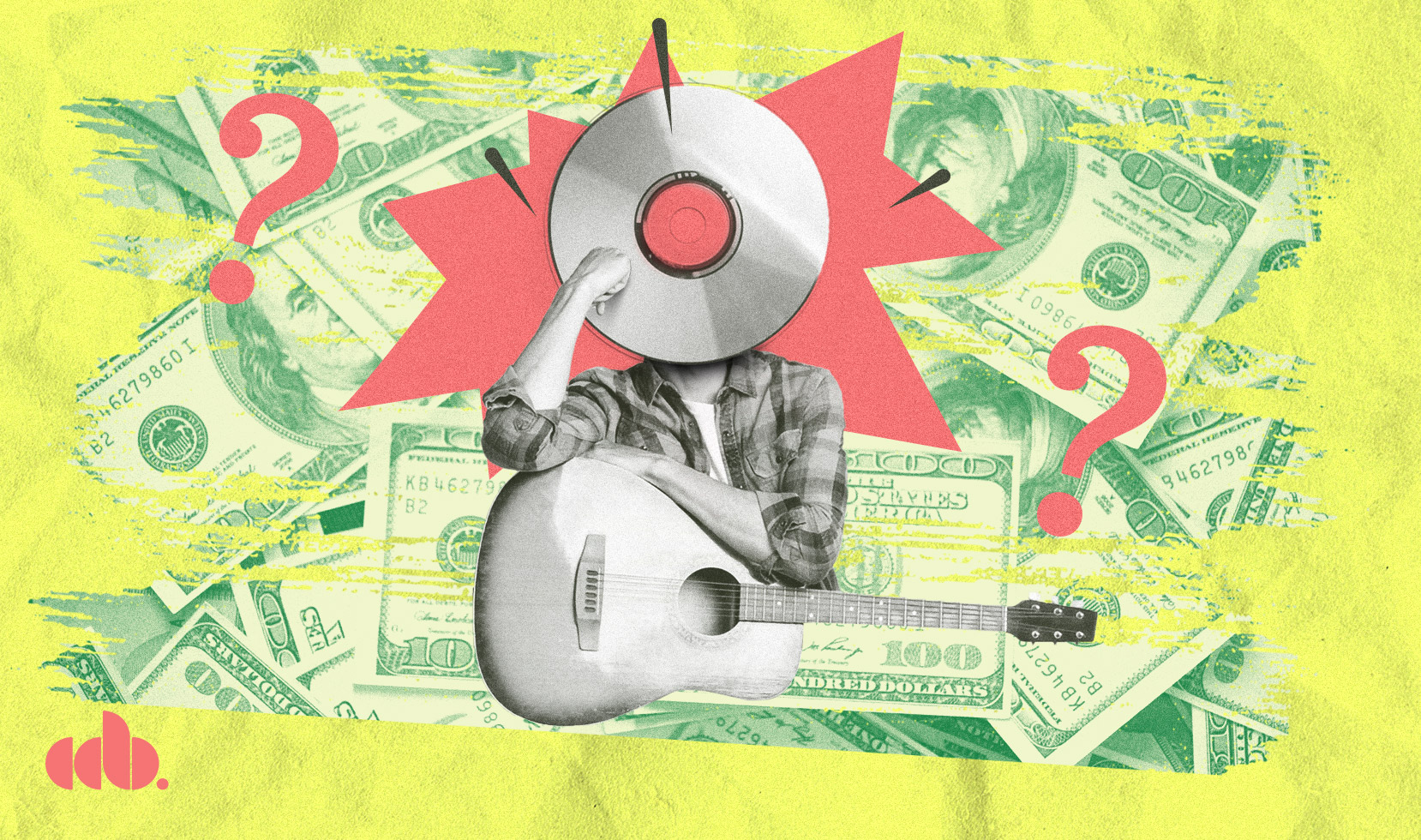
How much should you charge for your CDs?
$5? $10? $12.99? $15.72?
Let me say upfront that there’s no clear answer to this question.
Your CD’s selling price will be determined by a number of factors. And it’s more complicated than simply adding up your various costs and then charging above that sum.
Ten things to consider when setting your CD price:
1. Manufacturing costs
Did you pay to professionally manufacture CDs?
Calculate how much each unit costs.
That’s the most obvious basic expense you want to recoup per sale.
2. Production Costs
How much did you pay for engineering, production, mixing, and mastering?
While it’d be great, of course, to recoup these expenses by selling through your first pressing of CDs, oftentimes your production costs are NOT the best factor to consider when determining your CD’s selling price.
Why? Firstly, it’s a one-time expense that has nothing to do with the quantity of discs you’ve made.
You could’ve spent $30,000 recording an album for which you only pressed 1000 CDs. You’re not going to charge $30 per CD, are you? Of course not. And if you sell a million copies, that $30k ain’t nuthin’ but some chump change!
On the other hand, if the difference between a $9.99 and $12.97 selling price will help you recoup some of your production costs over the course of your first disc pressing, it IS worth considering those expenses — and probably going with the slightly higher selling price.
Then again…
3. Customer acquisition costs
Many new businesses plan to lose money at first in order to attract customers.
In other instances, businesses have “loss leader” products, meaning they sell certain things at a loss in order to attract customers that will purchase other products or services later.
In your case, that may mean spending money to build your fanbase. These costs could come in the form of online marketing, touring at a loss, a PR campaign, making merch, and pressing CDs.
What I’m trying to say is: It’s perfectly fine to treat your CD sales as something BESIDES an attempt to recoup or profit in the short-term.
If that’s how you view your CD sales, it might make sense to choose a lower price to move more units.
4. Royalties
Are there any cover songs on your album? You’ll need to pay a mechanical royalty on every single unit of the CD you’ve manufactured.
Do you owe other kinds of royalties, such as publishing splits among co-writers or points for the producer?
You might want to factor those costs into your selling price, too.
5. The competition
You’re not the only one with a CD to shill; hundreds of other albums are being released every single day! Just because you’ve labored over every detail of your album for the last two years doesn’t mean you can charge unreasonable prices for your CDs.
Are you an indie band somewhere between unknown and regionally-recognized? I’d say between $5-$15 is sane. Much more than that and folks are going to think twice before buying.
Also, consider the fact that your album will be available to hear on streaming platforms for much less than the cost of a CD. If your physical album is too expensive, most fans will just go digital.
6. Context and variable pricing
Context matters when it comes to physical album sales. You’re allowed to keep things flexible and test different prices in different markets and settings.
You might sell a CD for $10 on consignment at a local record store, offer it wholesale for $6, charge $15 at a show in a wealthy area, or do “pay what you want” at a college gig.
At a house concert where real connections have been made, people are going to want to take something home to remember you. In that kind of setting I might break my previous rule and suggest something closer to $20.
7. Odd number pricing
Pricing involves a little bit of mind games.
$9.99 sounds closer to $9 than $10. Add that extra penny and all of a sudden people are thinking double digits. $12.97? That sounds way cheaper than $13!
Yes, it’s a trick. Use it.
8. Free, plus shipping
People love free shipping. Sometimes you can charge more for a CD as long they think they’re getting a deal on shipping.
The opposite can also be true. It’s possible to profit by giving away your CD for FREE, as long as the customer pays for shipping. How? If you throw an upsell opportunity into your online sales process, you can incentivize additional purchases before checkout.
“Before you get your free CD, want to purchase the matching t-shirt?”
When I did a “free plus shipping” offer for one of my albums, more than 50% of the people claiming the free CD bought one or more additional items.
9. Bundles
Along with variable pricing, loss-leader products, and upsells, you also have an opportunity to discount your CDs as part of a merch bundle.
One album for $15. Two for $20. Three for $25.
We love getting a good deal. And with bundles, a “good deal” can actually mean spending MORE money than they might otherwise.
10. Your stories (and your autograph) matter
In a streaming age, it’s worth remembering that a CD is often a piece of memorabilia. It’s a standard way to commemorate the connection between artist and audience.
So more important than how you set your CD price is how you tell your story. The ways you convey your brand. How you draw people into your live shows or social content. What kinds of VIP experiences you offer online to invite fans into your world.
The deeper your fans can go, the more they’ll be willing to pay — even if they never take your CD out of the shrink wrap.
And speaking of shrink-wrap, YOU should take that off yourself and autograph the CDs you mail to customers. That extra bit of personalization will take you ten seconds, but it’s worth a whole lot more to your customer. If you have other ways to customize your mailer — a handwritten letter, stickers, fliers, lyric sheets — you should wow the person who purchased from you.
Those little extras transform commerce into connection.
Obviously there’s a lot to think about in terms of pricing your CD at that perfect point where fans are happy to buy, and you still make enough money to — well — make some money.
How have you determined your CD’s selling price?
As a music buyer, how much is too much? Let us know in the comments section below.
Sell more merch online
If you want to move more CDs, vinyl, t-shirts, and other merch through your website and social, check out our episode of The DIY Musician Podcast called “eCommerce 101 for Musicians”:
